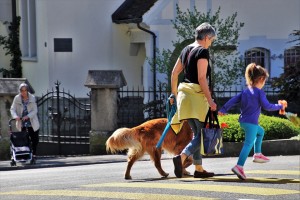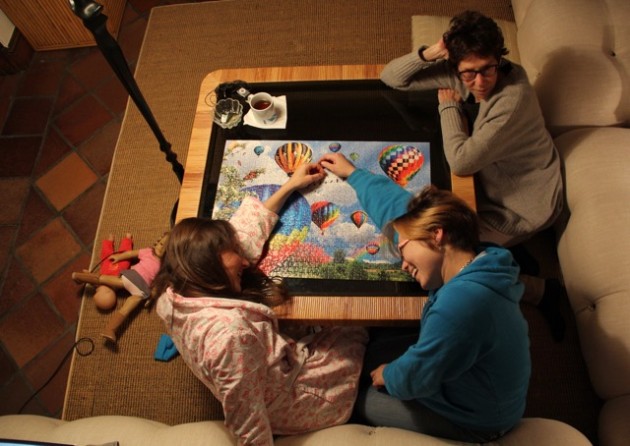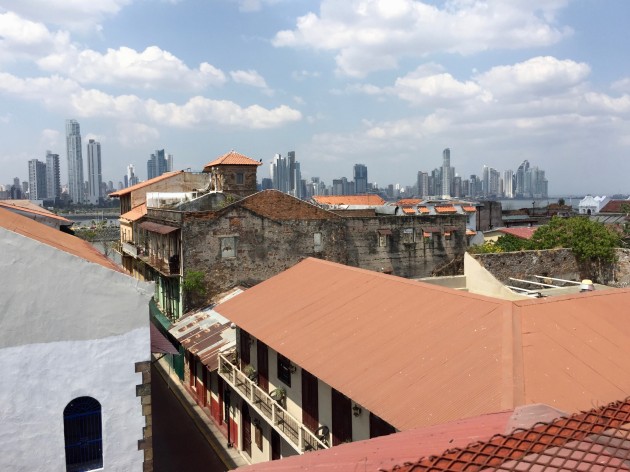Author Archives: Marlena Maduro Baraf
January 31, 2019 by Marlena Maduro Baraf
My Tía Adelaide at the End of Life
“The end of life has its own nature, also worth our attention. I don’t say this without reckoning in the sorrow, the worry, the many diminishments. But surely it is then that a person’s character shines or glooms.” Mary Oliver in “Our World.”
My tía Adelaide, 102, was holding herself with such poise that I almost didn’t notice the clear, oxygen tubes draped around her ears and into her nostrils. Her voice was faint, but she looked resplendent in a turquoise Mumu with coral flowers that reminded me of the watercolors she painted not so long ago.
“I’m on my seventh Jeffrey Archer book,” she had said on that rainy day. We sat at her balcony overlooking a sea of buildings in Panama City, where I was born. The attendant had placed my tía’s wheelchair next to the caged periquitos; and, as we talked, tía Adelaide’s freckled fingers would reach into the wire cage for one seed and then another that she placed expertly into the birds’ tiny beaks. I noticed a large, mean-looking bruise on her calf from a recent fall.
- 1 Comment
May 11, 2018 by Marlena Maduro Baraf
A Grandmother’s Mindfulness
 When my granddaughter is peaceful, I can sometimes see words making their shapes behind her face. Her eyes dart here and there, and they stop. Words spill past her ruby lips. “…that other fruit, the one that’s not an orange… pomegranate… like my party dress…”
When my granddaughter is peaceful, I can sometimes see words making their shapes behind her face. Her eyes dart here and there, and they stop. Words spill past her ruby lips. “…that other fruit, the one that’s not an orange… pomegranate… like my party dress…”
I try to coast along on her reverie.
Penny is seven. She’s figured out that I exist when she’s not around. I come and go. I will go; she knows this too.
“Grandma, you are going to die because you’re old.” I am on my way up the stairs and Penny hurls this thought at me across the railing. Then she hesitates and adds less brightly, “If you eat healthy and do your exercise, you won’t die so fast.”
At seventy-two I am one year older than my mother when she died. I think of this most days as my life rushes by, a job, a husband, and self-imposed obligations. Hours are whizzing by, and I can’t unspeed the clock.
When we play “Just Spit It Out!” and Penny gets to go first being the youngest and is asked to name two breakfast foods served at Wendy’s, Penny pulls her shoulders up, tight up to her neck. Her eyes open big, and she lifts herself high on her tippy toes. “Eggs and bananas!” She laughs and runs into the kitchen.
In a tub full of rubber ducks Penny lets me wash her thick hair that is almost black and rinse it many times, as long as I hand her the slip-on terrycloth mitt to squeeze against her eyes. My own hair is thinning; the color is quickly fading. Who will wash my thinning hair?
Will I be trusting?
Penny has become a little sharp. I can no longer bite her arms in jest. Turns her head with a frown; she lets me know. She will show me her painting when she is ready. She is the youngest of two, pushed by a now-bossy sister.
I pay attention.
This is what I do.
- No Comments
May 10, 2017 by Marlena Maduro Baraf
A Mother’s Day Love Letter to My Daughters-in-Law

“The DIL/MIL relationship is a new piece in the universe of connections.”
We begin by sorting and piling up the tiny cardboard pieces. Emily searches with her eagle eye for textures—the folds of fabric in a velvet gown. Brushstrokes. Hair. Kelly looks for like-minded colors; I, for the straight-edge pieces. Daydreaming, one of us will catch sight of a perfect interlocking pair in the chaos of the box. “First One!”
During school break in December, our sons and their families land at our small house in New York. The rooms fill with children’s voices, Lego parts and Barbies. We eat serial breakfasts that last all morning, bake walls and roofs for the gingerbread houses the children will decorate with miniature candy, and manage to subdue any uncomfortable disagreements among the children or adults. Inevitably, someone has brought a 2000-piece puzzle, and during the visit, Emily, Kelly, and I lock ourselves in mind-numbing togetherness at the glass coffee table in my living room.
Emily and Kelly are my DILs. I’m their MIL. I have two daughters-in-law, two sons, and four grandchildren. Until recently I didn’t use the shortcut DILs; I learned this from the young. When Kelly said two years ago only half jokingly, “My MIL would not want that,” I got a surprising hint at the filter through which she was seeing me.
Could it be that the discomfort between in-laws lies in the name? Mother-in-law becomes not-like-mother, mother-once-removed, mother-to-beware-of…. Same for DILs.
- No Comments
August 5, 2016 by Marlena Maduro Baraf
Yellow Rose of Texas: 100 Birthday Candles in Panama

Panama City from the rooftops of the old quarter.
The D.J. at the end of the room has been instructed to open with “The Yellow Rose of Texas” and to play tía Adelaide’s old favorites. I look up. You can’t avoid looking up. The ceiling is as tall as a palm tree. We are in Casco Antiguo, the old, colonial quarter of Panama City where buildings date back as early as the 1600’s. My American husband and I took an Uber so as not to drive the narrow brick roads in the dark. The venue for the party is a bank built in 1904 that had been involved in the financing of the Panama Canal. Family have helped Adelaide with the preparations. Her sister-in-law, Connie, 92, brought Adelaide weeks before to taste the food and to approve the flowers.
When she called me in New York several months ago, tía Adelaide had said, “I invited all the people I care about. Will you come?” She’d insisted on a party on her 99th the year before, “in case I don’t make it to three digits.” I’d flown in for that too. It’s not every day that a family member becomes a centenarian.
Since Adelaide arrived in Panama in 1935, the Jewish community has changed dramatically. Our group—Kol Shearith Israel—is the smallest, descendants of Spanish-Portuguese Jews who arrived in Panama in the 1850s. There are now three Jewish congregations and six synagogues with a total of 15,000 members, the majority families of Sephardic Jews who emigrated from Arab countries—and from Israel after World War II. In recent years there have been waves of immigrants from Latin American nations in periods of trouble: Colombia, Argentina, and now Venezuela.
- 2 Comments
 Please wait...
Please wait...